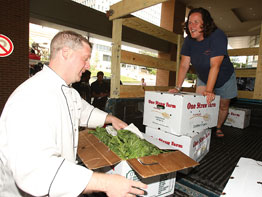As “Farmer Joan” slid boxes of produce to the edge of her pickup truck, executive chef Anthony Cover opened one to peel back a head of romaine lettuce fresh from the farm to ensure it had a tight head and a bright green color.
“Everything is iced, which is good,” said the chef for Cura Hospitality at Mercy Medical Center, Baltimore, the food and nutrition services provider for the hospital.
The produce in the dozen or so white cardboard boxes were driven straight to the city hospital from One Straw Farm in White Hall, the largest certified organic vegetable farm in Maryland.
Mercy is among a group of hospitals that signed the Maryland Hospitals for a Healthy Environment Initiative coordinated by the University of Maryland School of Nursing. The Local Foods to Local Hospitals program aims to help hospitals provide healthier, local, and sustainably produced foods for patient, staff, and visitor meals.
Other Catholic hospitals are participating as well: Good Samaritan Hospital of Maryland and St. Agnes Hospital in Baltimore, and St. Joseph Medical Center in Towson.
Bon Secours Baltimore Health System participates in a similar program called Community Supported Agriculture (CSA) in which the community supports a farm by buying produce directly from the farmer.
As of June 4, every Wednesday a two-hour farmers’ market is held at the corner of Fulton Avenue and 1800 W. Fayette Street. The aim is to improve the quality of life in southwest Baltimore through Operation Reach Out South West.
“CSAs offer another way to improve food availability and provide access to healthy foods, fruits and veggies,” said Judith Carmichael, public relations coordinator.
Mercy hosted a briefing July 1 to promote the Local Foods program where locally-grown, chemical-free food is purchased and used to prepare meals. Local produce means less travel time, translating to fresher food.
The farmers’ boxes of produce also included collard greens, and red, yellow and rainbow chard to be used for soups and garnishes.
“We design the menu after what she’s harvesting,” said Mr. Cover, “and what’s in season. To know where it’s coming from is amazing. It’s a great solution.”
The chef looks to the farmer for more than just her fresh produce. Recipes are offered on Joan Norman’s Web site, onestrawfarm.com.
Mercy was already complying with many of the promises in the pledge they signed for the program, said Steve Lentz, district manager of Cura Hospitality who represented Mercy at the briefing. Signing the pledge makes them 100 percent compliant with the standards such as no antibiotic beef, composting and buying local produce when possible.
Mr. Lentz and his staff will encourage their vendors to comply as well.
“The more hospitals get on board, the easier it will be for suppliers and vendors to provide more cost effective products.”
Mercy serves fair trade coffee and milk that is free of rBGH (recombinant bovine growth hormone); composts food waste, recycles bottles, cans and cardboard; recycles fryer grease into bio-fuel, and uses recycled paper napkins. They have also switched from plastic and paper to using chinaware and silverware.
By eliminating Styrofoam, Mercy estimates its annual savings at $80,000.
The program calls for greater reliance on local chemical-free food and dairy products, and is intended to rely less on national food distribution; support local small farms and the state’s economy; increase hospital composting practices’ and reduce transportation costs.
The initiative is supported by the Maryland Department of Agriculture.


